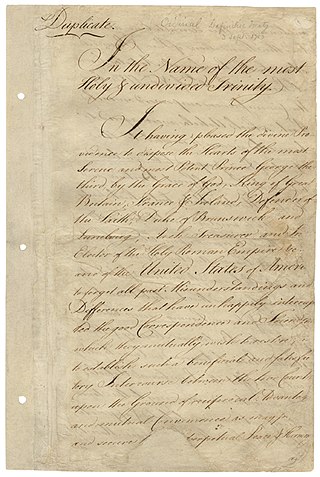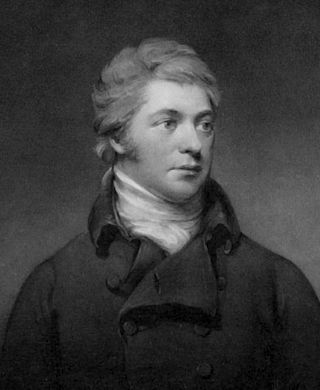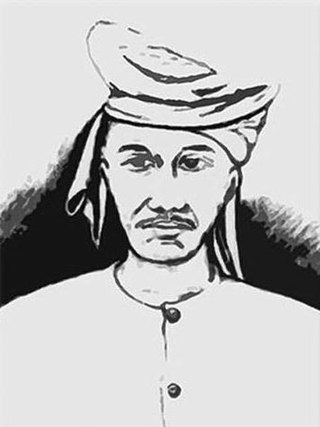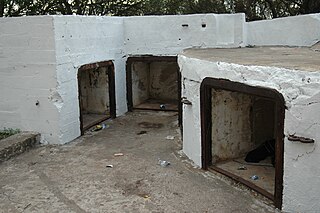
The American Revolutionary War, also known as the Revolutionary War or American War of Independence, was the military conflict of the American Revolution. American Patriot forces, organized as the Continental Army and commanded by George Washington, defeated the British, leading to the Treaty of Paris in 1783, in which Great Britain recognized the independence and sovereignty of the United States. In the war, American Patriot forces eventually gained the support of France and Spain. The British and Loyalist forces also included Hessian soldiers from Germany. The conflict was fought in North America, the Caribbean, and the Atlantic Ocean.

The Treaty of Paris, signed in Paris by representatives of King George III of Great Britain and representatives of the United States on September 3, 1783, officially ended the American Revolutionary War and recognized the Thirteen Colonies, which had been part of colonial British America, as an independent, sovereign nation.

Christoph Wilhelm Friedrich Hufeland was a German physician, naturopath and writer. He is famous as the most eminent practical physician of his time in Germany and as the author of numerous works displaying extensive reading and a cultivated critical faculty.

William Paterson was an American statesman, lawyer, jurist, and signer of the United States Constitution. He was an Associate Justice of the United States Supreme Court, the second governor of New Jersey, and a Founding Father of the United States.

George Nugent-Temple-Grenville, 1st Marquess of Buckingham,, known as George Grenville before 1779 and as The Earl Temple between 1779 and 1784, was a British statesman.

Bernardo Vicente de Gálvez y Madrid, 1st Count of Gálvez was a Spanish military leader and government official who served as colonial governor of Spanish Louisiana and Cuba, and later as Viceroy of New Spain.
Nicholas Van Dyke was an American Founding Father, lawyer, and politician from New Castle in New Castle County, Delaware. He served in the Delaware General Assembly, in the Continental Congress, where he signed the Articles of Confederation, and as president of Delaware.

Sir Thomas Miller, 1st Baronet FRSE, known as Lord Barskimming (1766–88) and Lord Glenlee during his judicial service, was a Scottish advocate, judge, politician and landowner. He was a founder member of the Royal Society of Edinburgh in 1783, and served as the society's first vice-president, 1783 to 1786.
Sholto Charles Douglas, 15th Earl of Morton was the son of James Douglas, 14th Earl of Morton.

Matías de Gálvez y Gallardo, KOS was a Spanish general, the Captain General of Guatemala from April 1779 to 3 April 1783, and Viceroy of New Spain from 29 April 1783 to 3 November 1784.

The Talpur dynasty were rulers based in Sindh, a region of present-day Pakistan. Four branches of the dynasty were established following the defeat of the Kalhora dynasty at the Battle of Halani in 1783: one ruled lower Sindh from the city of Hyderabad, another ruled over upper Sindh from the city of Khairpur, a third ruled around the eastern city of Mirpur Khas, and a fourth was based in Tando Muhammad Khan. The Talpurs were ethnically Baloch.

Thomas Wallace, 1st Baron Wallace, PC, FRSE was an English politician and peer.

This is a list of the principal holders of government office during the premiership of the Earl of Shelburne between July 1782 and April 1783.

Lorenz von Westenrieder was a well-known author and historian in Bavaria and a critic of the Elector Karl Theordor and supporter of Maximilian IV Joseph. There are several memorials to him in Munich.
Events from the year 1783 in the United States. The American Revolution officially ended with the Treaty of Paris.
Thomas Lewis O'Beirne, was an Anglican bishop, Bishop of Ossory from 1795 to 1798 when he was translated to Meath.

The Nuku Rebellion was an anti-colonial movement that engulfed large parts of Maluku Islands and Western New Guinea between 1780 and 1810. It was initiated by the prince and later sultan of Tidore, Nuku Muhammad Amiruddin, also known as Prince Nuku or Sultan Nuku. The movement united several ethnic groups of eastern Indonesia in the struggle against the Dutch and was temporarily successful, helped by an alliance with the British East India Company. After the demise of Nuku it was however defeated, and Maluku was restored under European rule. In modern time, Nuku was officially appointed a National Hero of Indonesia.

Tovey Battery was an artillery battery in the British Overseas Territory of Gibraltar.

Joseph Proctor was an academic of the University of Cambridge in the 18th and 19th centuries.
The 88th Regiment of Foot was an infantry regiment in the British Army from 1779 to 1783, formed during the American Revolutionary War. It was raised in Worcestershire under Colonel Thomas Keating and saw service in Jamaica. It was disbanded in England in 1783 at the end of the war.














